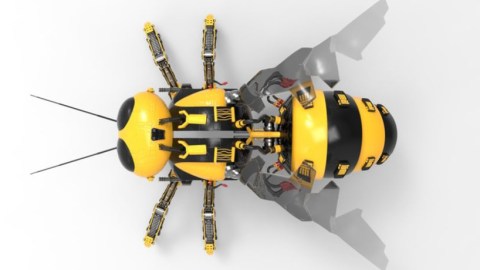Walmart just filed a patent for robot bees amid ongoing battle with Amazon

Walmart has filed a patent for robotic bees that would pollinate crops just like the real insects.
The patent outlines how tiny autonomous “pollination drones” would use sensors to locate crops, transport pollen, and verify which crops have been successfully pollinated. It would be a significantly more efficient way to pollinate crops than crop dusting, the patent suggests.
In total, Walmart has filed six patents for drone farming technologies, including ones that would identify pests and monitor crop health. The retail giant has yet to comment on exactly how it plans to use the new technology, but it’s possible Walmart plans to start an agricultural operation, a move that could help expand its grocery business and lead to more control of its food supply chain.
It’s among the latest developments in the ongoing battle between Walmart and Amazon over retail and, more recently, groceries. In February, Amazon began offering free same-day grocery delivery service to its Prime members in select cities, and earlier this week Walmart announced plans to offer grocery delivery service in more than 800 of its stores for a flat rate of $9.95.
The bee drone technology, which was explored in season 3 of Black Mirror, could theoretically give Walmart an edge in food production over the long term.
The decline of honeybees poses a major threat to the world’s food supply. About one-third of the food we consume – fruits, vegetables, herbs, and spices – depends on pollination from honeybees, which make up only 2 percent of the total bee population.
What’s killing the bees is hard to say. But it’s likely been a complex interaction of multiple stressors: Lack of genetic diversity among their populations, a shortage of space for honeybees to roam, parasites and diseases, and pesticides. There’s also colony collapse disorder, a phenomenon where the majority of the worker bees disappear from the colony, though the number of collapses has gone down over the past few years.
Other organizations have already developed or drafted ideas for similar robot bee technologies, including a team at Harvard University, a researcher at Japan’s National Institute of Advanced Industrial Science and Technology, and a student at Savannah College of Art and Design in Georgia. No robot bee technology is currently being used on a large scale, however.
Walmart’s drone technology could boost food production if honeybee populations continue to dwindle in the decades to come. But some experts, like Quinn McFrederick, an entomologist at the University of California, think it’s better to spend resources protecting the real bees we have today.
“On top of more practical arguments, such as costs to smaller farms,” he told NPR, “I would not like to live in a world where bees are replaced by plastic machines. Let’s focus on protecting the biodiversity we still have left.”





